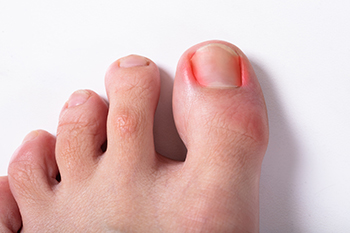
Ingrown toenails occur when the edge of the toenail grows into the surrounding skin, leading to pain, redness, and potential infection. Causes include improper nail trimming, tight footwear, injury, or genetic predisposition. To prevent ingrown toenails, it is important to cut nails straight across and avoid rounding the edges. Wearing properly fitted shoes that allow for ample toe room can also reduce the risk. Allowing toenails to breathe by wearing open-toed shoes occasionally promotes healthy nail growth and reduces pressure on the toes. If you have an ingrown toenail and the pain worsens or it appears infected, it is suggested that you seek prompt treatment from a podiatrist. This foot doctor can provide professional care, such as lifting the nail edge, prescribing antibiotics for infection, or performing a partial nail avulsion procedure if necessary.
Ingrown toenails may initially present themselves as a minor discomfort, but they may progress into an infection in the skin without proper treatment. For more information about ingrown toenails, contact one of our podiatrists of Orange County Podiatry. Our doctors can provide the care you need to keep you pain-free and on your feet.
Ingrown Toenails
Ingrown toenails are caused when the corner or side of a toenail grows into the soft flesh surrounding it. They often result in redness, swelling, pain, and in some cases, infection. This condition typically affects the big toe and may recur if it is not treated properly.
Causes
- Improper toenail trimming
- Genetics
- Improper shoe fitting
- Injury from pedicures or nail picking
- Abnormal gait
- Poor hygiene
You are more likely to develop an ingrown toenail if you are obese, have diabetes, arthritis, or have any fungal infection in your nails. Additionally, people who have foot or toe deformities are at a higher risk of developing an ingrown toenail.
Symptoms
Some symptoms of ingrown toenails are redness, swelling, and pain. In rare cases, there may be a yellowish drainage coming from the nail.
Treatment
Ignoring an ingrown toenail can have serious complications. Infections of the nail border can progress to a deeper soft-tissue infection, which can then turn into a bone infection. You should always speak with your podiatrist if you suspect you have an ingrown toenail, especially if you have diabetes or poor circulation.
If you have any questions, please feel free to contact our offices located in Irvine, Huntington Beach, Orange, Newport Beach, and Long Beach, CA . We offer the newest diagnostic and treatment technologies for all your foot care needs.



